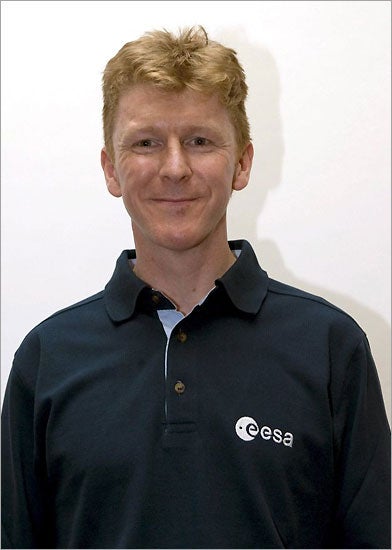Ground control to Major Tim - a UK breakthrough

Your support helps us to tell the story
From reproductive rights to climate change to Big Tech, The Independent is on the ground when the story is developing. Whether it's investigating the financials of Elon Musk's pro-Trump PAC or producing our latest documentary, 'The A Word', which shines a light on the American women fighting for reproductive rights, we know how important it is to parse out the facts from the messaging.
At such a critical moment in US history, we need reporters on the ground. Your donation allows us to keep sending journalists to speak to both sides of the story.
The Independent is trusted by Americans across the entire political spectrum. And unlike many other quality news outlets, we choose not to lock Americans out of our reporting and analysis with paywalls. We believe quality journalism should be available to everyone, paid for by those who can afford it.
Your support makes all the difference.Briton Major Timothy Peake was named by the European Space Agency (ESA) today as one of its six new astronauts.
He was chosen for missions to the International Space Station "and one day to the Moon and beyond" after a gruelling selection process which attracted more than 8,400 people, said the ESA.
His selection, announced at a press conference in Paris, is a surprise as the UK has so far opted out of the agency's human spaceflight programme.
Maj Peake, 37, from Salisbury in Wiltshire, spent 18 years as an officer in the Army, joining the Army Air Corps, before becoming a helicopter test pilot for Augusta Westland.
Speaking at the press conference this afternoon, the clearly delighted new astronaut said: "It is a unique opportunity in my life to be part of a team that can have such a positive effect on humanity.
"I feel it's a great privilege to be part of the team and I'm very happy to be working alongside some very talented people."
Maj Peake was picked alongside Italian Samantha Cristoforetti, German Alexander Gerst, Dane Andreas Mogensen, Italian Luca Parmitano and Frenchman Thomas Pesquet.
His selection is a surprise because the UK does not contribute to the ESA's human spaceflight programme.
So far the only Britons to have gone into orbit are those who have secured private funding or US citizenship and joined Nasa.
Britain's space programme instead favours robotic exploration instead of sending humans into space. The ESA hopes that will now change.
Director-general Jean-Jacques Dordain said: "They have been selected only on their merits since they represent the three biggest contributors, (smaller contributors) and one, a not-yet contributor."
The six were chosen after a Europe-wide recruitment process which started last year and involved "thorough" psychological, medical and professional screening, said the agency.
They are the first new recruits to join the European Astronaut Corps since 1992 in only the second astronaut selection carried out by ESA.
Mr Dordain said: "We are at a turning point in ESA's human space flight activities. Last year, with the launch of the Columbus laboratory and the Jules Verne Automated Transfer Vehicle, ESA became a fully-fledged member of the International Space Station partnership.
"This new phase required the recruitment of young talent able to draw on the experience gained by the existing astronauts, able to become, step by step, the representatives of Europe in space.
"They all represent the generation that will move from low earth orbit to the Moon."
Simonetta Di Pippo, ESA director of human spaceflight, added: "This result exceeds our greatest expectations. Not only do we have a group of outstanding astronauts, we also have a representation of European countries that reinforces the support for human spaceflight and exploration in Europe.
"This is a very important day for human spaceflight in Europe. These young men and women are the next generation of European space explorers.
"They have a fantastic career ahead, which will put them right on top of one of the ultimate challenges of our time - going back to the Moon and beyond as part of the global exploration effort."
The new astronauts will start their basic training at the European Astronaut Centre in Cologne, Germany.
Join our commenting forum
Join thought-provoking conversations, follow other Independent readers and see their replies
Comments